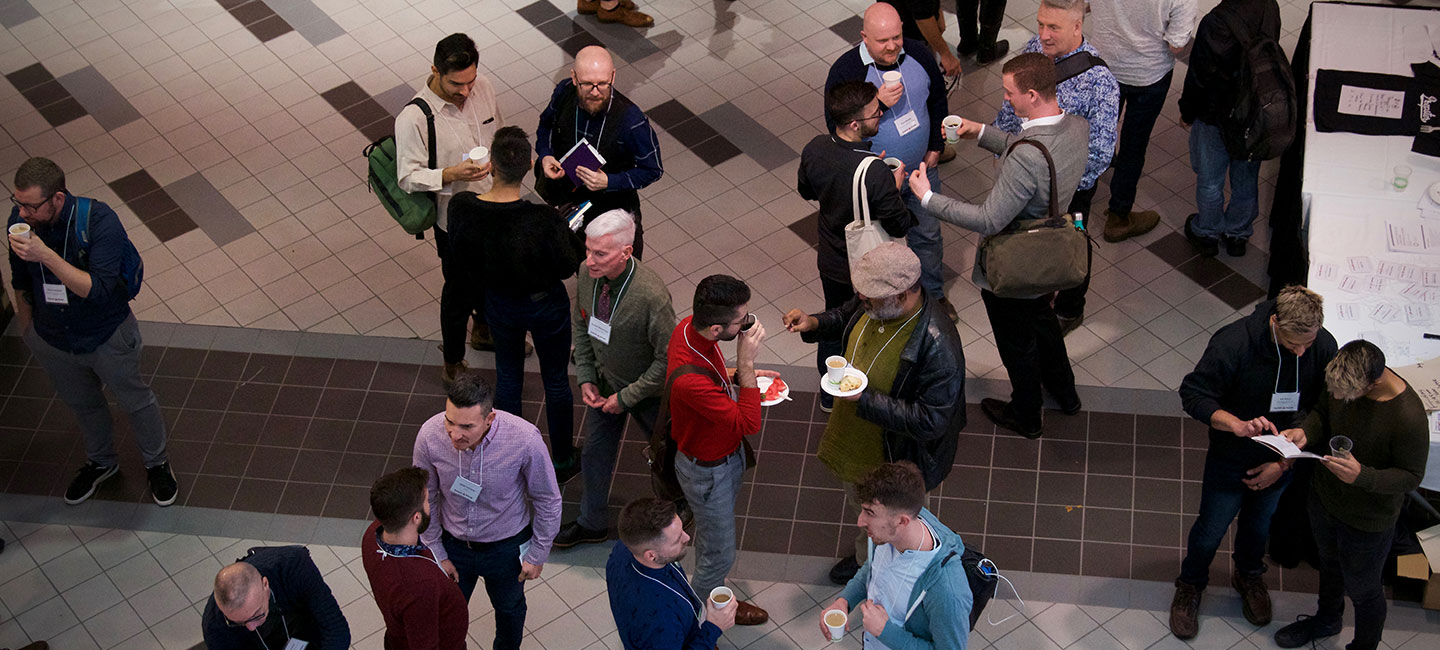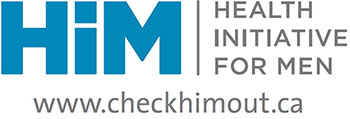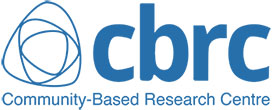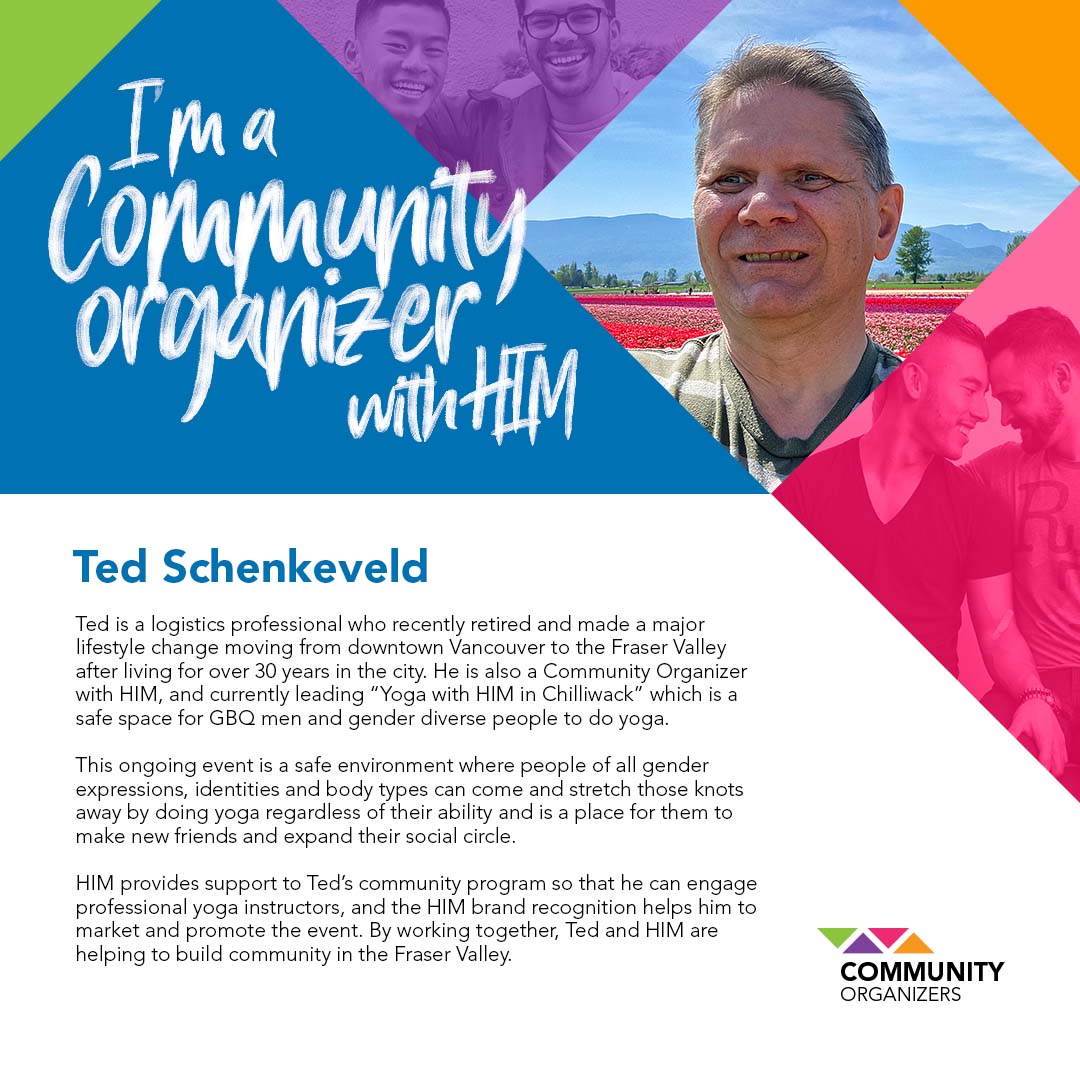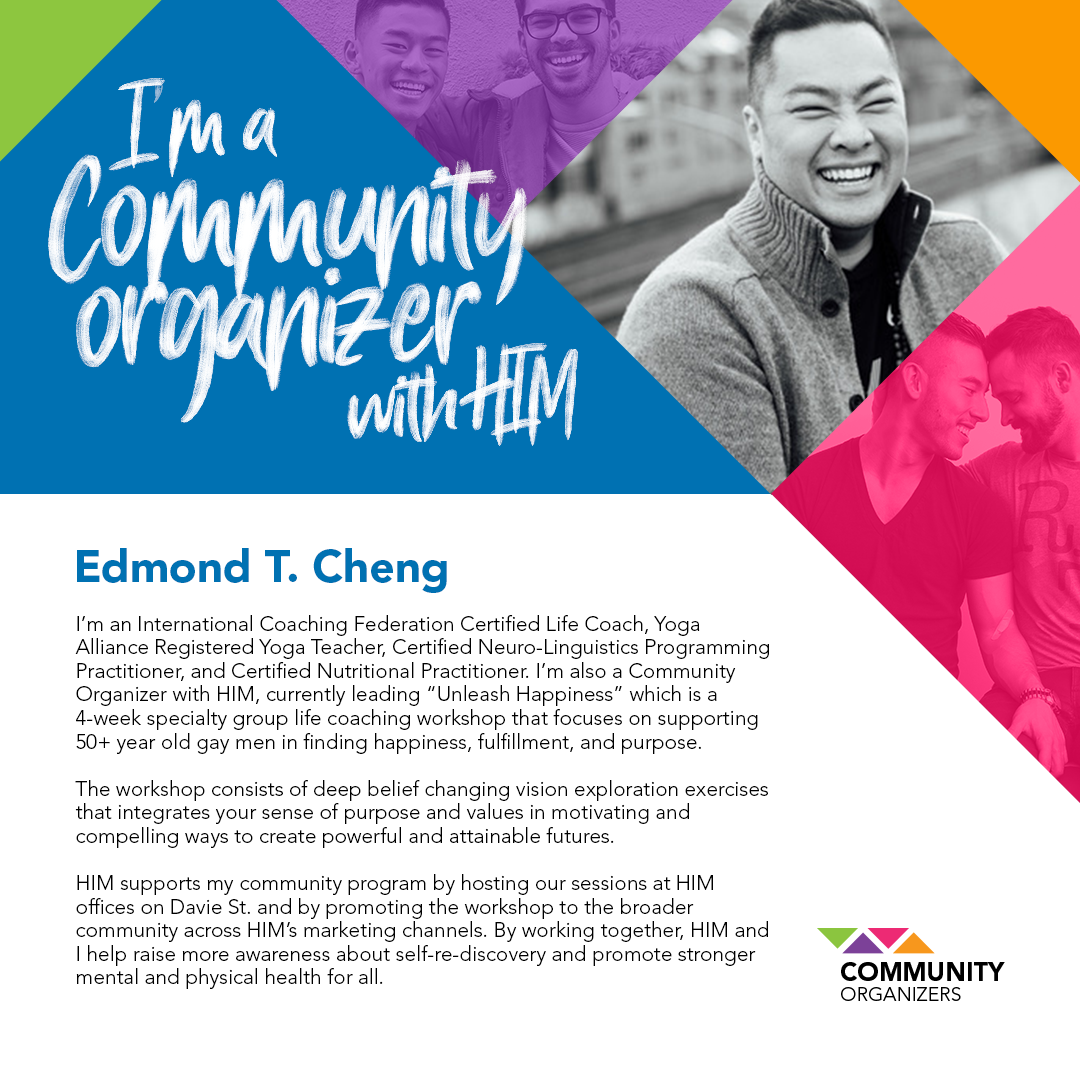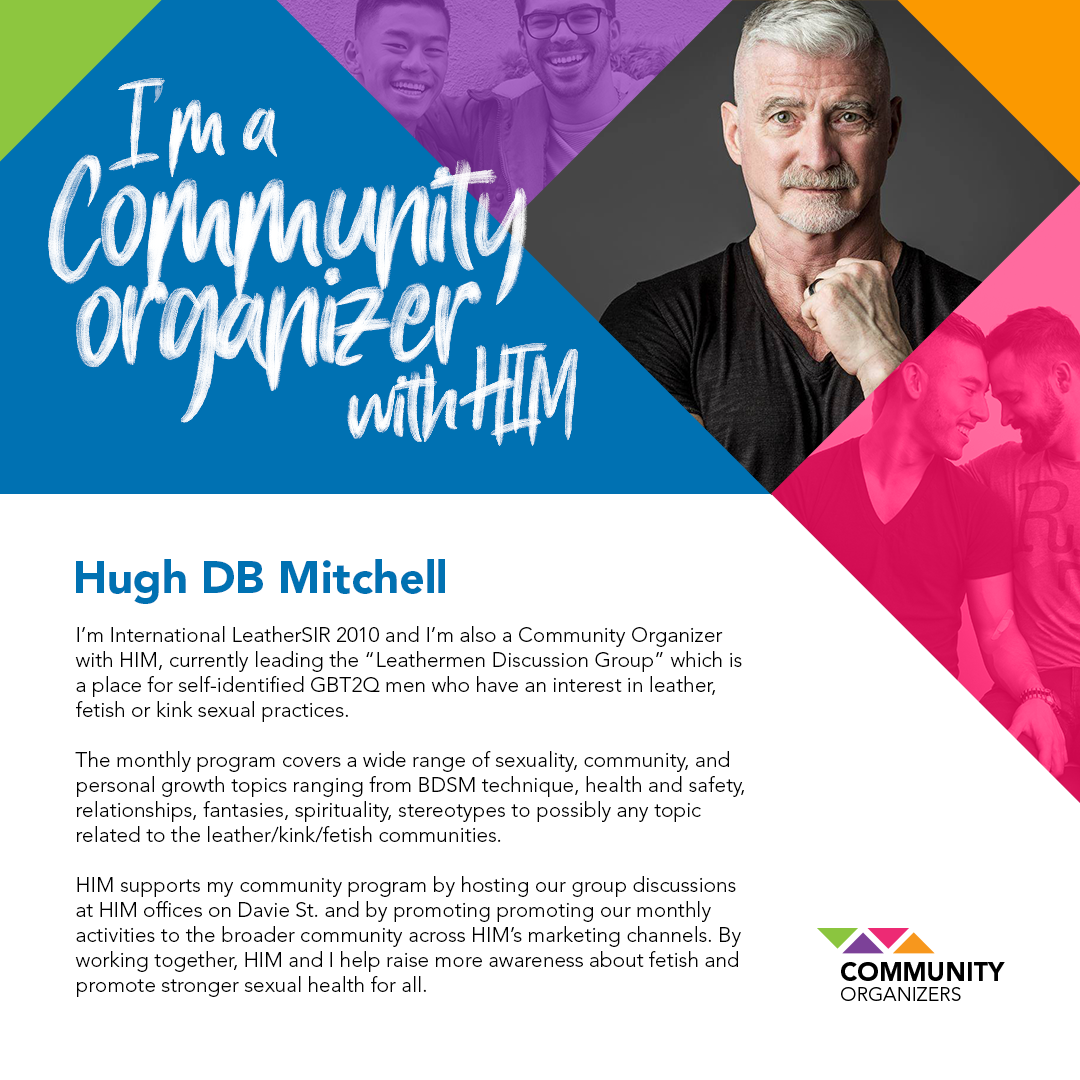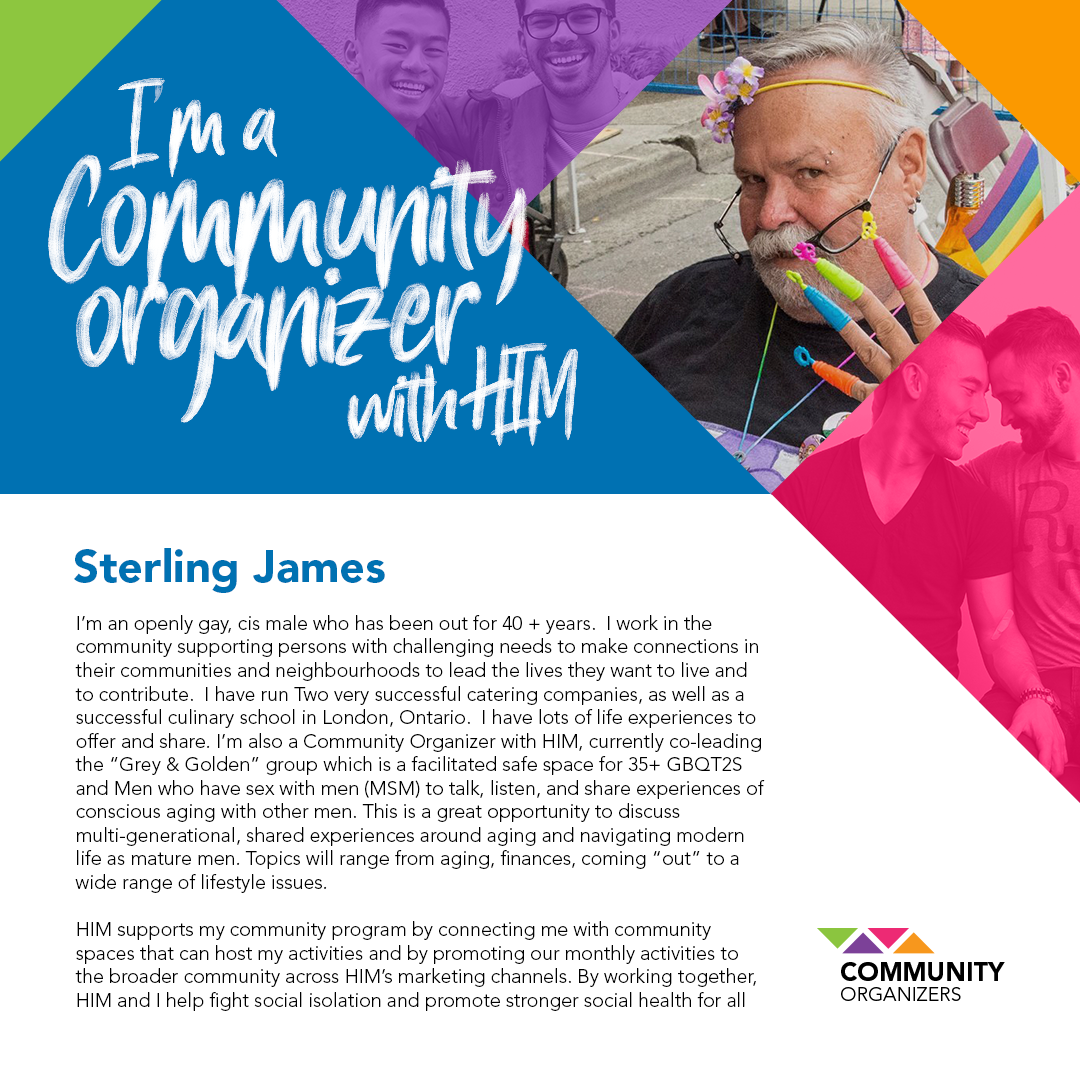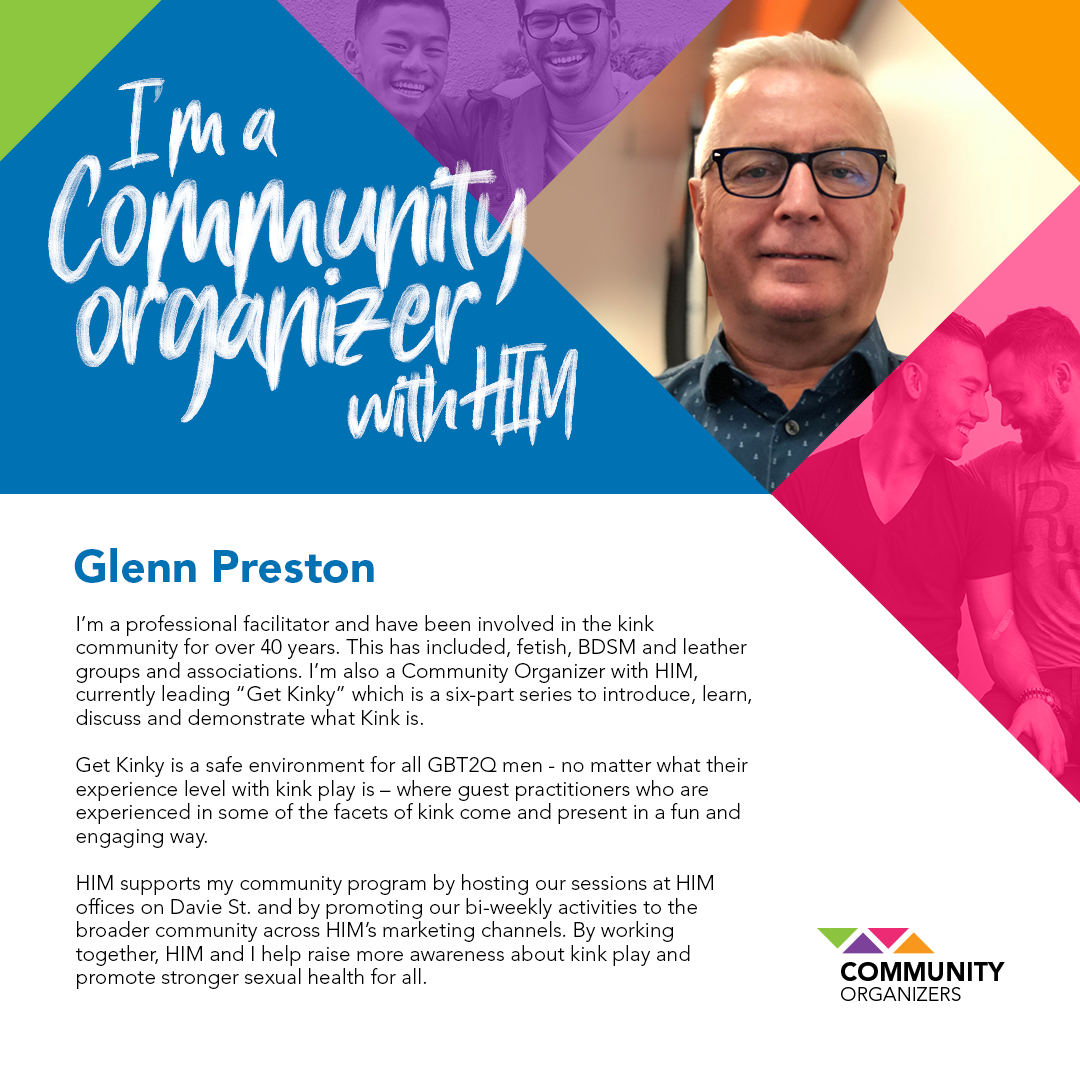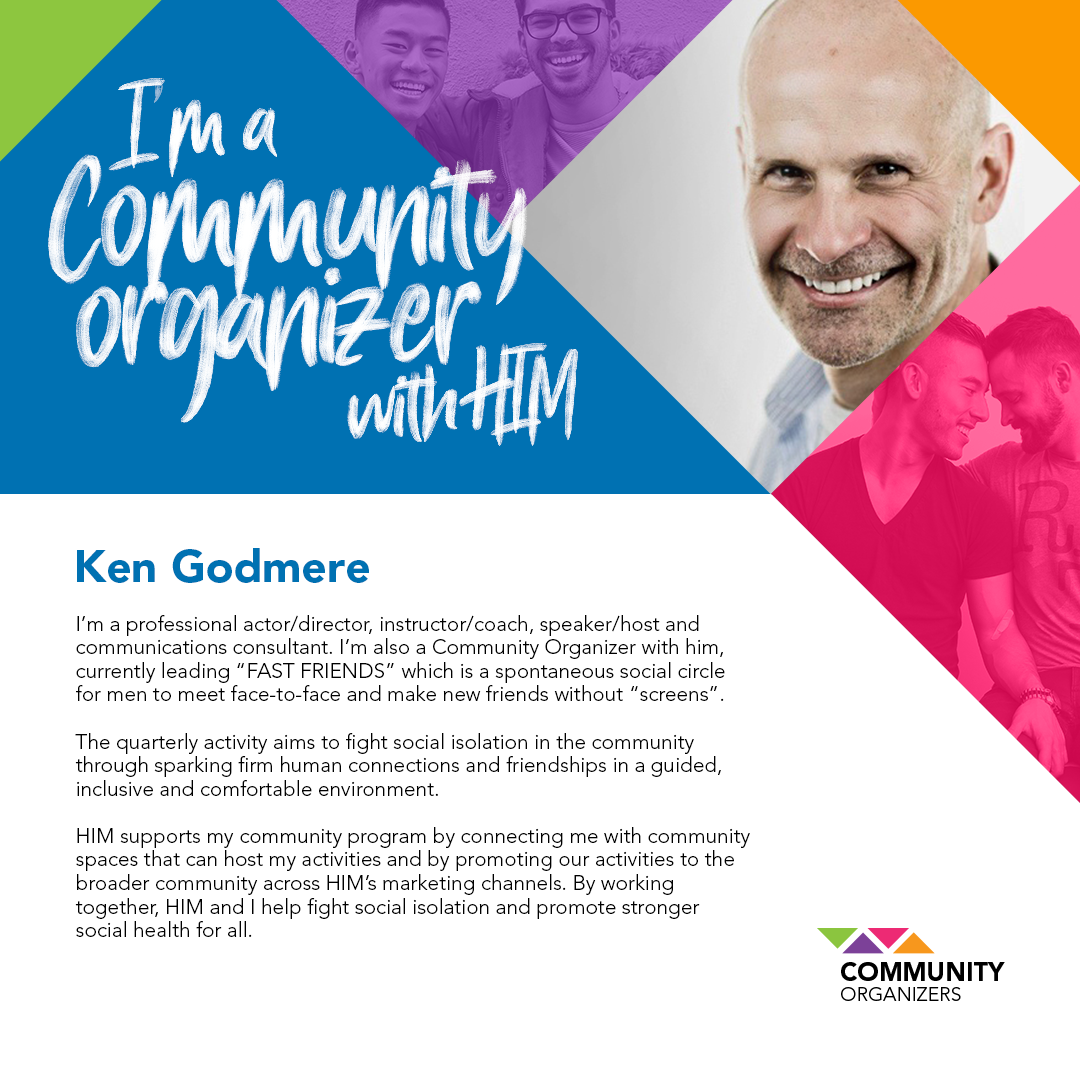Do you belong to the communities of self-identified gay, bi, queer (GBQ) men, and gender diverse people that HIM serves? Are you an artist or content creator passionate about the health of your communities? Want a paid opportunity to learn online, create content, and share it with the masses? If so, it sounds like the BC CommA 2021 program is the right fit for you!
About BC Community Advocates (BC CommA)
BC Community Advocates (BC CommA) is an annual program that aims to keep community members up-to-date on the latest in gay, bi, queer (GBQ) men, and gender diverse people’s health. Each year, BC CommA participants are invited to attend the Summit (an annual two-day knowledge exchange and capacity building conference on gay, bi, trans, Two-Spirit, and queer (GBT2Q) health)) and participate in workshops and gatherings unique to CommA. Participants build relationships with each other and professionals in the field. They exchange knowledge and resources relating to how they can engage with and support the wellbeing of their queer communities effectively.
BC CommA 2021
Following the successes of BC COMMA 2020’s virtual format, BC CommA and the Summit 2021 will be online this year to help flatten the curve and ensure the safety of the participants.
For BC CommA 2021, we are seeking artists and content creators to attend at least two online Summit 2021 sessions exploring specific topics related to the health and wellbeing of queer communities. Participants will then create a piece of content inspired by what they’ve learned which will be shared widely online. And we’d love for one of those people to be you!
With the ongoing closure of live theatres, art galleries, and the art industry throughout the course of the COVID-19 pandemic, we recognize that now more than ever, artists need meaningful platform to express, and sustain themselves. During the unprecedented time in the art industry, BC CommA is seeking artists and content creators for a paid opportunity to attend at least two of the online Summit sessions. Artists and content creators will then create a work or content inspired by something you’ve learned that has resonated with you. It is our hope to empower the local communities through informed and meaningful art and media content.
If you’re an artist or content creator who’s interested in a paid opportunity to learn about the wellbeing of your communities online, create content, and have us share it with the masses, then fill out this quick application form!
Eligibility
- Identify as a part-time, or full-time artist (e.g.: photographer, actor, poet, illustrator, drag performer) and/or content creator (e.g.: YouTubers, Tik Tokers, Instagram Influencers);
- Self-identify as a member of the communities of gay, bi, queer (GBQ) men, and gender diverse people;
- Live in British Columbia;
- Be 19 years of age or older;
- Passionate about improving the health and wellbeing of you queer communities!
Not sure you are eligible? Shoot us an email at [email protected] and we’ll get back to you ASAP.
Commitment
What are we asking you to do?
- Attend online orientation(s) where you will learn about what to expect attending the online Summit and meet with program participants. [Mid-October]
- Attend at least two online Summit sessions live. [Wednesday October 27th– Friday 29th, 2021]
- Create a piece of content inspired by the session you attended (to be shared alongside a short interview) [to be completed by December and shared online in January]
- Participate in two to three debrief/evaluation sessions [November 2021-January 2022]
What will you receive for your contributions?
- Compensation: All BC CommA participants will receive a $250 honorarium in recognition of their time, talent, and efforts.
- Expense Reimbursement: the BC COMMA 2021 participants will be reimbursed up to $250 to cover eligible/pre-approved content creation costs (i.e. canvas for painters, honoraria for models/performers). Receipts required for reimbursement.
- Exposure: HIM and its partners will promote your creation via social media across the country.
- Support: You’ll have direct support from a HIM staff member or one of our partners to help see you through each step of the process.
Any questions about the eligibility or commitment, please email Louis Lin at [email protected]
How to apply? / Common FAQs
How to apply?
Fill out this quick online application!
Applications will be opened until October 6th, while reviewed by a committee and informed of selections by mid-October.
Any questions about the eligibility or commitment, please email Louis Lin at [email protected]
Who can apply?
- Identify as a part-time, or full-time artist (e.g.: photographer, actor, poet, illustrator, drag performer) and/or content creator (e.g.: YouTubers, Tik Tokers, Instagram Influencers);
- Self-identify as a member of the communities of gay, bi, queer (GBQ) men, and gender diverse people;
- Live in British Columbia;
- Be 19 years of age or older;
- Passionate about improving the health and wellbeing of you queer communities!
What is the Summit?
The Summit is an annual knowledge exchange and capacity building conference on gay, bi, trans, Two-Spirit, and queer (GBT2Q) health. Since 2005, the Summit has brought together researchers, service providers, community members and organizations to present the latest in GBT2Q health.
This year, the Summit is focusing on disrupting and reconstructing. The COVID-19 pandemic has caused huge disruptions and innovations, alongside significant loss, preventable death and increased criminalization. As gay, bi, trans, Two-Spirit and queer (GBT2Q) people, we’ve spent decades pushing back against a so-called “universal” health care system that has often failed our communities. The pandemic, in many ways, amplified the injustices and inequities embedded within our systems and society. Rather than a “return to normal,” we must leverage the disruption caused by COVID-19 to re-imagine a system that addresses the gaps in care that existed before the pandemic and were heightened during it.
Learn more about the Summit and the Summit 2021: Disrupt and Reconstruct here.
Where and when is the Summit?
The Summit is an annual conference that usually takes place in the land of Coast Salish Peoples, also known as Vancouver, British Columbia. This year, the Summit will be online due to the COVID-19 pandemic.
Summit 2021 will be hosted again online on October 27-29th. Each conference day will include approximately 4 hours of virtual programming to facilitate live participation across Canada.
What if I have a question?
If you have questions, comments, and concerns, please feel free to contact Louis Lin at [email protected]
Past BC CommA Program
BC CommA 2018
HIM, in partnership the with Community-Based Research Centre (CBRC) and Men’s Health Initiative (MHI), co-sponsored 13 community members to attend 2018’s The Summit (formerly known as Gay Men’s Health Summit). During their stay in Vancouver, the Community Advocates participated in a number of mingling lunches and dinners where they networked and exchanged their experiences and stories. This included a dinner at La Casita after the first day of the Summit where they relaxed and had a chance to get to know each other better, and a working lunch at the Summit where they shared ideas on how to advocate for the health of their queer communities.
On the Saturday after the Summit, the participants gathered at HIM on Davie for a debriefing session, and to receive a tour of the office and the Health Centre from Hans Bosgoed, the Associate Director, Clinical Services. Visiting the health centre and learning about its operations proved to be very interesting for the participants. A number of the participants got in touch with HIM to discuss implementing, lobbying for, or improving similar already-existing services in their home communities.
The BC CommA 2018 program was a big success, and the participants described their experience as inspiring and rewarding and left with new knowledge and enthusiasm for doing meaningful community work. We are excited to do what we can to continue supporting 2018’s CommA participants in their work to improve the health of their queer communities, and look forward to having a new cohort to join us at next year’s the Summit!
CommA 2018 Participants:
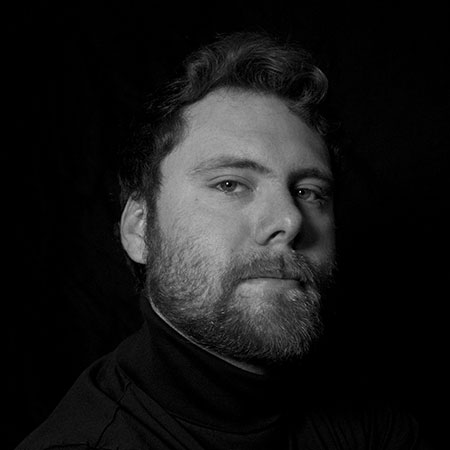
Jared
Attending the 2018 Summit was a memorable and valuable experience, and I am grateful to have had this opportunity to learn about queer men’s health. I left the summit with renewed confidence to make positive change in my community.
Read More
A topic that related well to my home city of Abbotsford is [internalized] shame… It leads to heightened stress and internalizing negative emotions, and is associated with suicidal tendencies. Accessing help for these issues is difficult for some, either due to external factors such as inadequate insurance for mental health care, or internal factors such as the stigma associated with seeking out that kind of help. Hosting regular social events and continuing the sexual and physical health programs already in place is vital to expanding queer community engagement and the use of those services… Other equally viable strategies also exist, and I am eager to begin working with other members of the queer community in my region to expand on what we can do to help others. We have a unique opportunity to help others, and by staying motivated and setting the right goals we can improve the quality of life for everyone here.
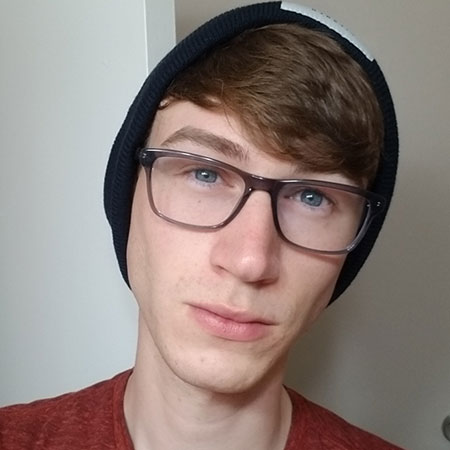
Connor
It was both refreshing and interesting to have a talk about consent in the GBMSM community. Going into this presentation I was a little skeptical because although consent is a very basic concept,
Read More
many people within our community assume certain behaviours are acceptable. Nolan tackled the topic in a very interesting manner by first asking us what the unique needs and assumptions of our community were. One point that came up for assumptions was that certain spaces mean/equate to consent which is something that you observe at almost any gay bar in a larger city. Nolan provided a set of tools to aid anyone being a bystander for sexual assault, which to this day I have never heard about and are very useful. I attend the Mpowerment group in Prince George and I think consent is something that everyone should be conscious of. I plan on sharing this information with other individuals that attend Mpowerment PG and friends from other municipalities. Hopefully by doing this, it will prevent others from having to go through what I did.
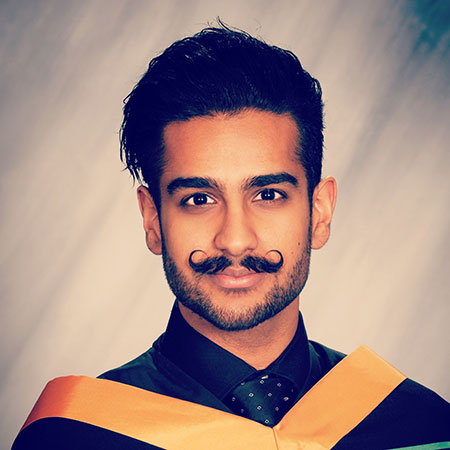
Jay
Standing hand in hand, listening to elders welcome us to the Summit, set the tone for the conference. Unity. The feeling of acceptance, collaboration and cohesiveness of the Summit community fostered innovative thinking and discussion.
Read More
This was especially true with the Indigenous component of the conference, where elders elaborated on the meaning of two-spirit and the history of sexuality for different indigenous communities. Another major topic during the conference was mental health and suicide among gay, bisexual and men who have sex with men (gbMSM). Working in crisis and suicide prevention, I believe this knowledge was the most useful to me. Learning about factors contributing to greater mental illness, barriers to accessing services, and possible solutions to decreasing mental illness and suicide will aid the Crisis Centre serve the gbMSM population in Northern BC better. I’m thankful for this opportunity and hope to return to the Summit in following years.
Patrick
RN Overdose Prevention Worker
I would like to discuss my feeling as I left the presentation given by Vincent Francoeur, “Crystal meth Interventions.” What I enjoyed most about this presentation was the presentation style used by Mr. Francoeur.
Read More
The narrative used was one of sharing the stories and lived experience of both his group participants as well as both himself and colleague, the group facilitators. I came away from this presentation with a greater understanding of how the actual process of crystal meth consumption affects both the psyche and physiology of the consumer as well as the ensuing ripple effect of dysfunction that befalls the consumer.
The illicit street drug epidemic, specifically crystal meth, has affected communities large and small, locally, nationally and internationally. As I work with my local population, I feel I have been armed with useful tools to empower both myself and my colleagues in all my volunteer capacities to further educate and empower others as we struggle to work with the ever growing population of crystal meth users in my community. This is an ongoing and growing issue encountered within my community. In discussion with my community partners, an open dialogue has already started. They look forward to hearing more about what I have gleaned having attended The Summit 2018.
BC CommA 2019
Health Initiative for Men (HIM), in partnership with the Community-Based Research Centre (CBRC), sponsored 11 community members from outside of Greater Vancouver across the province to attend the 2019 BC Community Advocates program. BC CommA participants arrive with the curiosity of finding new strategies to strengthen the work they do back in their communities and create new connections.
Throughout their stay in Vancouver, the participants attended an ice breaker dinner with an educational presentation from HIM staff about how gay men’s community organization function and history of HIM as a case study. In addition, participants were able to attend the Summit and partook in note-taking for specific sessions of their choice. The Summit (hosted by CBRC), provided a great opportunity to access and exchange the latest health promotion techniques and tools. They reported their experience to be enriching and encouraging, with many expressing renewed motivation to translate the newly established connections and gained knowledge into action plans for their respective communities.
Much like the Summit 2019’s theme suggests, it is only through addressing barriers that we can advance as a collective and diverse community. As the BC Community Advocate Program wrapped up its second year of programming, we at HIM are proud to continue the effort of providing a time and space for folks outside of Vancouver to participate in the program, and return home to translate what they have learned into valuable resources for their own communities.
CommA 2019 Participants:
Marshall
(now Program Coordinator at AVI Health and Community Services)
These flavours of oppression and barriers to access for the diverse array of folks in our communities brought forth new ideas of discussions and information sessions I’d like to bring into the Island Health Region.
Upon reflection after attending the CBRC Summit 2019, there were several sessions and takeaways that stood out for me. I really appreciated the Two-Spirit rites of passage plenary by Dr James Makokis. He’s a fantastic speaker and role model in our community…Andrew Gurza’s plenary on disability and sex was also an important one to hear. This is the kind of voice that is not heard enough in our communities. Acccessibility in all forms is not talked about nearly enough in the queer community, especially in smaller cities and towns. For this reason, I also really appreciated the workshop on healthcare access for folks on the autism spectrum. But I really related to a lot of Andrew’s experiences of being marginalized within the greater queer community, through my own experiences navigating queer men’s spaces as a trans man…These flavours of oppression and barriers to access for the diverse array of folks in our communities brought forth new ideas of discussions and information sessions I’d like to bring into the Island Health Region.
RILEY
(now Program Coordinator at Crisis Centre Prince George)
I have observed a number of tools that are already affecting my work in positive ways, whether that be better and more pertinent resource referrals for MSM, knowledge of best sex practices and how to get access to GBT friendly medical care.
2019 was the first year that I had the pleasure of attending the summit. The experience was both personally and professionally fulfilling, and I cannot fully express my gratitude for having been given the opportunity to take part in such an event. Being a young gay man from the far north, I have had difficulty making a meaningful connection to the GBT2Q+ community as a whole; involvement in the summit provided me with a sense of connectedness to supports and like-minded individuals that I would not have been able to build on my own…As one small piece of the mental health puzzle here in northern BC…I have observed a number of tools that are already affecting my work in positive ways, whether that be better and more pertinent resource referrals for MSM, knowledge of best sex practices and how to get access to GBT friendly medical care, a deeper understanding of service users who come from indigenous backgrounds, or a fresh network of professional supports available to me. The summit was able to spark new areas of interest in my field of study and I hope to continue my learning next year at the 2020 CBRC Summit.
SKYE (now Program Coordinator at Mpowerment Prince George)
Overall, I feel the Summit was a great asset in teaching me about the challenges that I have to overcome, but also understand some of the challenges that my fellow queer/trans community members face.
The 2019 Summit was very useful experience for many reasons; coming from a Northern rural city, it was great to experience Queer/Trans focused event. A couple highlights for the Summit for me was getting to hear about James Makokis’s work with trans and two spirited individuals and hearing the keynote on accessibility/disability. The combination of both keynote speakers was very inspiring because I personally identify with some of the issues discussed. James’ speech was important to me because it was heavily rooted in culture and indigenous teaching which obviously is very close to my upbringing. I feel like his speech was empowering to indigenous people… Overall, I feel the Summit was a great asset in teaching me about the challenges that I have to overcome, but also understand some of the challenges that my fellow queer/trans community members face.
BC CommA 2020
In 2020, Health Initiative for Men (HIM), in partnership with Community-Based Research Centre (CBRC), was able to sponsor nine artists and content creators who belong to the communities of self-identified gay, bi, queer men and gender diverse people from across the province to virtually attend the 2020 BC Community Advocates (BC COMMA) program.
In response to the ongoing COVID-19 pandemic and our effort to help flatten the curve, both BC COMMA and the Summit were held online this year. We recognized that art can be an amazing vehicle for community members to share and gain knowledge around the many issues that affect our communities. Thus, BC COMMA 2020 sponsored a total of nine artists from across BC to attend at least one online Summit workshop and then create a piece of work or content inspired by what resonated with them from that workshop. These pieces also act as ways of sharing the knowledge BC COMMA participants gained at Summit with community members who see their amazing work.
Throughout February, we showcased a total of 13 artwork/ content produced by our nine artists via social media and the BC COMMA website. In the month-long showcase, each artist was able to receive a spotlight, highlighting their inspiration behind their artwork(s) while also demonstrating the dedication to, and product(s) of, their craft. Ranging from digital creations to a hand-painted piece with beadwork, we are proud to empower local communities through informed and meaningful art and media content that also share the knowledge gained by BC COMMA participants attending the Summit with all of us. Throughout the years, we have known that art is a strong tool of resistance and survival for our communities, and we are glad to have celebrated this long tradition of centering art and artists through the BC Community Advocates Program this year.
Check out the Summit-Inspired Arts from the COMMA 2020 artists and content creators!

